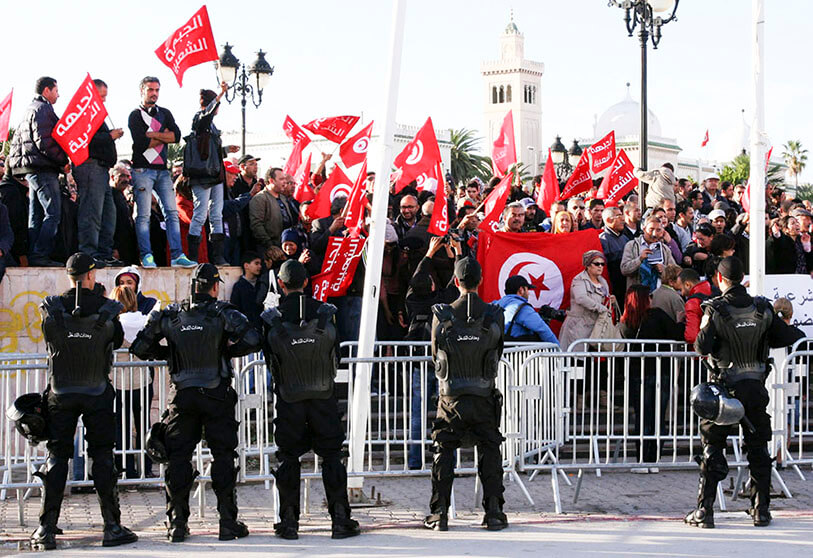The speaker of Tunisia’s parliament Rached Ghannouchi has called for “peaceful struggle” against a return to “absolute one-man rule”. Ghannouchi described the situation as “a step back, a decade after Tunisia’s 2011 revolution.
“It’s a step backwards. A return to the 1959 constitution. A return to the absolute power of one man against which the revolution took place.”
“There is no longer any alternative to struggle, naturally a peaceful struggle, because we are a civil movement. The Tunisian people are against violence. We hope that Ennahdha, the other parties and the civil society will fight to recover their constitution and their democracy.”
READ ALSO: Northern elders slamed by Pro-Buhari group over criticism of President
The country’s president announced plans to draft a new electoral code and appoint a transitional leadership and to hang on to the exceptional powers that he seized in July, throwing the country’s young democracy into question.
It was earlier reported that, the Tunisian President Saied moves to cement one-man rule.
He declared on Wednesday that he will rule by decree and ignore parts of the constitution as he prepares to change the political system, prompting immediate opposition from rivals.
Saied has held nearly total power since July 25 when he sacked the prime minister, suspended parliament and assumed executive authority, citing a national emergency in a move his foes called a coup.
His intervention has undermined the democratic gains of Tunisia’s 2011 revolution that ended autocratic rule and triggered the Arab Spring, despite Saied’s pledges to uphold the freedoms won a decade ago.
As the weeks have passed, he has come under growing pressure from Tunisian political players and Western donors to name a prime minister and explain how he intends to move past the crisis.
The new measures announced on Wednesday go far beyond the steps he took in July, writing into the official gazette rules that transform Tunisia’s political system to give the president almost unlimited power.
Rules published in the official gazette allow him to issue “legislative texts” by decree, appoint the Cabinet and set its policy direction and basic decisions without interference.
The elected parliament, which he suspended in July using a highly contentious reading of the constitution, will not only remain frozen but its members will stop being paid their salaries. They will still be stripped of immunity from prosecution.
Saied did not put any time limit on his seizure of power, but said he would appoint a committee to help draft amendments to the 2014 constitution and establish “a true democracy in which the people are truly sovereign”.
The presidency said that in the meantime only the preamble to the existing constitution and any clauses that do not contradict the executive and legislative powers he has seized will remain in force.
Fragmented parliament
The leader of the moderate Islamist Ennahda party, the biggest in the deeply fragmented parliament and a member of successive governing coalitions, immediately rejected Saied’s announcements.
Rached Ghannouchi said the announcement meant cancelling the constitution and that Ennahda, which had already declared Saied’s July 25 intervention a coup, would not accept that.
A senior official in Heart of Tunisia, the second-largest party in parliament, accused Saied of conducting a “premeditated coup.”
“We call for a national alignment against the coup,” the official, Osama al-Khalifi, said on Twitter.
This month a Saied adviser told Reuters that Saied was planning to suspend the constitution and offer a new version via a public referendum, prompting a backlash from the powerful labour union and political parties.
Saied has denied having dictatorial aspirations, insists his moves are constitutional and has vowed to uphold the rights of Tunisians.
His broadly popular intervention came after years of economic stagnation and political paralysis, aggravated by a sharp spike in COVID-19 cases and a day of violent protests.
READ ALSO: Abuse: Nigerian soldier filmed assaulting female corps member
However, as the weeks have passed a growing number of Tunisians have grown concerned by the lack of clarity on Saied’s plans and the absence of a prime minister.
Rights groups have also pointed to the arrest of several parliament members and business leaders on a variety of charges, including some old ones that were reactivated after their immunity was removed.
One of the detained parliament members told Reuters on Wednesday he had been freed.
After criticism over the reported widespread use of travel bans against people in the political and business elite, Saied said last week that only people facing a judicial warrant or summons would be stopped from leaving Tunisia.
The first protest against Saied since his intervention took place on Saturday, and activists have called for a larger one this weekend.














